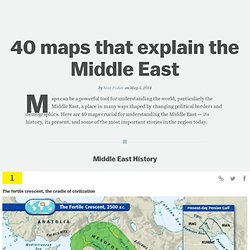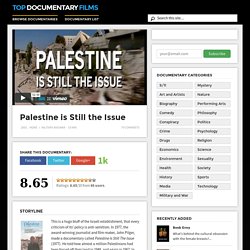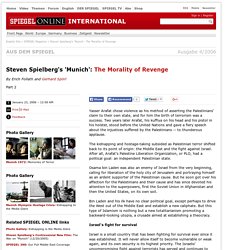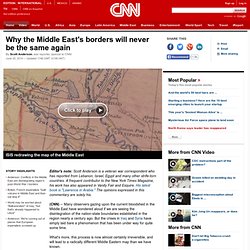

The Middle East Conflict c.1914-47. Conflict in Israel and Palestine: Crash Course World History 223. Glossary. The Middle East conflict is hard to solve but easy to explain - Dennis Prager - Page full. The Middle East conflict is difficult to solve, but it is among the simplest conflicts in history to understand.

The Arab and other Muslim enemies of Israel (for the easily confused, this does not mean every Arab or every Muslim) want Israel destroyed. That is why there is a Middle East conflict. Everything else is commentary.
The reason Why Israel can't withdraw to its pre '67 borders line. MIDDLE EAST CONFLICT Introduction. 40 Maps That Explain The Middle East. Maps can be a powerful tool for understanding the world, particularly the Middle East, a place in many ways shaped by changing political borders and demographics.

Who Likes Whom in The Middle East? Key players & Notable relationships. INFOGRAPHICS - MIDDLE EAST. The Israel Palestine Conflict by Mr Few on Prezi. The Birth of Israel. Palestine is Still the Issue. This is a huge bluff of the Israeli establishment, that every criticism of its' policy is anti-semitism.

Elusive Peace: Israel and the Arabs. Before seeing Spielberg’s ‘Munich,’ take a look at ‘21 Hours at Munich’ “21 Hours at Munich” 1976 Starring: William Holden, Franco Nero, Anthony Quayle, Shirley Knight and Richard Basehart Running time: 100 minutes...

Steven Spielberg's 'Munich' Yasser Arafat chose violence as his method of asserting the Palestinians' claim to their own state, and for him the birth of terrorism was a success.

Two years later Arafat, his kuffiya on his head and his pistol in his holster, stood before the United Nations and gave a fiery speech about the injustices suffered by the Palestinians -- to thunderous applause. The kidnapping and hostage-taking subsided as Palestinian terror shifted back to its point of origin: the Middle East and the fight against Israel. After all, Arafat's Palestine Liberation Organization, or PLO, had a political goal: an independent Palestinian state.
Iran's Revolutions: Crash Course World History 226. I've Never Seen the Israel/Palestine Conflict Illustrated More Uniquely Than This. The story shared by Israel and Palestine has been told in several stunning films, but I don’t think I’ve ever seen it told like this.

Nina Paley created this (extremely brief) animated history of the land that was at one time called Israel, Palestine, Canaan and the Levant. She even created this viewer’s guide to make sense of what’s happening. (Want to dive in deeper? Check out these excellent films.) Who’s Killing Who? Because you can’t tell the players without a pogrom! Early Man This generic “cave man” represents the first human settlers in Israel/Canaan/the Levant. Canaanite What did ancient Canaanites look like?
Egyptian. 1967 (Six Day) War. Ww1 & 2. Germany, Hitler (and everything else) Home - Trove. Palestine Is Still the Issue. John Pilger made the film 'Palestine Is Still The Issue' in 1977.

It told how almost a million Palestinians had been forced off their land in 1948, and again in 1967. Twenty five years later, John Pilger returns to the West Bank of Jordan and Gaza, and to Israel, to ask why the Palestinians, whose right of return was affirmed by the United Nations more than half a century ago, are still caught in a terrible limbo - refugees in their own land, controlled by Israel in the longest military occupation in modern times. "If we are to speak of the great injustice here, nothing has changed," says Pilger at the start of the film, "What has changed is that the Palestinians have fought back. Stateless and humiliated for so long, they have risen up against Israel’s huge military regime, although they themselves have no army, no tanks, no American planes and gunships or missiles. Some have committed desperate acts of terror, like suicide bombing.
Munich Movie Review & Film Summary (2005) Steven Spielberg's "Munich" is an act of courage and conscience.

The director of "Schindler's List," the founder of the Shoah Foundation, the most successful and visible Jew in the world of film, has placed himself between Israel and the Palestinians, looked at decades of terrorism and reprisal, and had one of his characters conclude, "There is no peace at the end of this. " Spielberg's film has been called an attack on the Palestinians and he has been rebuked as "no friend of Israel. " By not taking sides, he has taken both sides. The film has deep love for Israel, and contains a heartfelt moment when a mother reminds her son why the state had to be founded: "We had to take it because no one would ever give it to us. Whatever it took, whatever it takes, we have a place on earth at last.
" Munich Movie Review & Film Summary (2005) Why the Middle East's borders will never be the same again. Anderson: Conflicts in the Middle East are disintegrating region's post-World War I bordersBritish, French imperialists "built volcano in Middle East and then sat atop it"World may be worried about "Balkanization" of Iraq, "but that's already happened to Libya"Anderson: We're running out of places that European imperialists screwed up Editor's note: Scott Anderson is a veteran war correspondent who has reported from Lebanon, Israel, Egypt and many other strife-torn countries.

A frequent contributor to the New York Times Magazine, his work has also appeared in Vanity Fair and Esquire. His latest book is "Lawrence in Arabia. " Sykes-Picot drew Middle East′s arbitrary borders. The dramatic developments in Iraq have their underpinnings in a secret, nearly century-old accord between a British colonel and a French consul.

In the Sykes-Picot Agreement, Mark Sykes of Britain and George-Picot France agreed upon the division of Ottoman Empire territories in 1916. The catch: At that time, the Ottoman Empire still existed. Its caliph, or spiritual-political leader, was at that time Sultan Mehmed V (1908-1918), followed by Mehmed VI (1918-1922). Sunnis and Shias: Islam's ancient schism. Image copyright AP The divide between Sunnis and Shia is the largest and oldest in the history of Islam. Members of the two sects have co-existed for centuries and share many fundamental beliefs and practices. But they differ in doctrine, ritual, law, theology and religious organisation. Their leaders also often seem to be in competition.
From Lebanon and Syria to Iraq and Pakistan, many recent conflicts have emphasised the sectarian divide, tearing communities apart. Search for Middle East conflict teaching resources. Internet History Sourcebooks. Middle East Conflict. The Official Website of The Amman Message - The Amman Message.